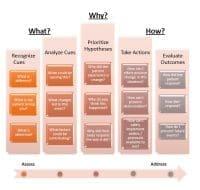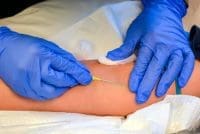Healthcare professionals should know that most, if not all, patients have low health literacy, according to The Joint Commission. The U.S. National Library of Medicine notes that health literacy is the capability of the individual seeking medical care to recognize and comprehend “basic health information” in order to make safe decisions as a partner in care. Health literacy indicates a patient’s knowledge and abilities in arriving at informed healthcare decisions
Nurses need to be sensitive to the fact that many individuals don’t understand even the simplest medical information. In addition, older patients, who are at risk for increased health problems, also are most at risk for poor health literacy. This in turn can lead to poorer health outcomes including death. The financial hardship of low health literacy as a result of frequent emergency department visits, hospital admissions, as well as delayed recovery and medication errors, is enormous and estimated to be in the trillion-dollar range, according to Scott.
Nurses can be leaders in improving health outcomes by identifying those with poor health literacy skills.
Warning signs
According to Smith, 77 million people in the United States lack basic health literacy skills. Warning signs are often subtle but recognizable, including patients who
- ask the nurse to read the instructions by making excuses such as they left their glasses at home
- want to wait to review information later with their family members
- are unable to explain a medication’s intended action or even to name what medications they are taking
- miss appointments
- don’t follow up with ordered lab or imaging tests.
Unfortunately, in many cases patients are labeled nonadherent when, in fact, they don’t understand the complicated medical instructions. The nurse must realize that the information provided during a patient encounter may not be understood.
Solutions
Strategies to help patients with poor health literacy without causing them embarrassment or anxiety include creating a comfortable environment, being compassionate, and being perceptive. Asking the patient to explain health information taught to them will ensure that they are aware. Use of open-ended questions, such as “Why are you taking this pill?” “What questions do you have for emptying this drain, I will watch you empty the drain before you leave” help in reinforcing verbal information. Writing down information and allowing satisfactory read back is always helpful.
Despite their extensive education, too many nurses don’t understand health literacy, so don’t identify it in their patients. Including more information about this topic in basic nursing programs, and in continuing education opportunities, could help improve outcomes.
Improving outcomes
By understanding that the information provided during a patient encounter may not be understood and taking steps to ensure comprehension, nurses can rise to the challenge of improving health outcomes.
Cally Graniero and Florence Graniero are staff nurses at James A. Haley Veterans’ Hospital in Tampa, Florida.
Selected references
Kolar TR, Kaučič BM, Kolnik TS. The role of the nurse in improving health literacy among older adults. Pielęgniars two XXI Wieku. 2017;16(2):23-8.
Scott SA. Health literacy education in baccalaureate nursing programs in the United States. Nurs Educ Perspect.2016;37(3)153-58.
Smith LS. When your patient can’t read or write. Nursing. 2015;45(2):67-9.
The Joint Commission. (2007). What did the doctor say? Improving health literacy to protect patient safety. jointcommission.org/assets/1/18/improving_health_literacy.pdf
Weiss BD. Health literacy: A manual for clinicians. 2003.http://lib.ncfh.org/pdfs/6617.pdf
U.S. National Library of Medicine. (2013). Health literacy. nnlm.gov/initiatives/topics/health-literacy


















